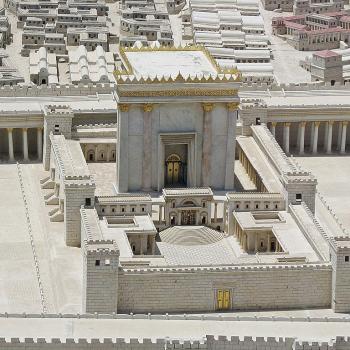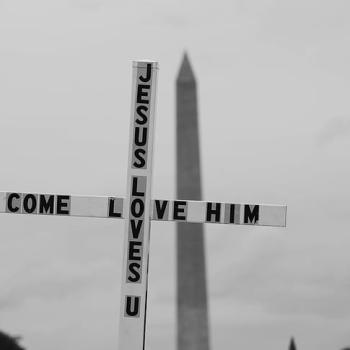Sometimes, it is out of anger and resentment, for not getting what we want from God. It is the cry of a child, and, it should not be surprising that in a society which has not yet learned to grow up, this cry is a popular one, demonstrating once again, that God is denied, not out of any logical analysis or metaphysical contention, but out of simple resentment. Underneath that resentment is an unconscious belief in the God we are fighting against. We can’t be angry and upset at someone who we don’t believe exists, though we can find all kinds of excuses to deny such belief and hide the truth from ourselves.
Sometimes, it is based upon a poor understanding of God, usually because we received a poor representation of God from those who tried to teach us about him. A false image for God, whichever form that God is found in, certainly will end in a denial of that God, when such falsehood is discerned. Many quit there: we were fooled once and do not want to be fooled again, although we unconsciously put something in the place of God, often our own ego. The deconstruction of falsehood is needed, and so the atheist rejection of God often highlights what needs to be reconsidered. Instead of being a means to deny the divinity, however, what lies beyond that deconstruction is what needs to be found and used to make for a presentation of God. This is what the apophatic tradition understood. Our images of God remain crude due to our limited ability to comprehend God – those who understand our images as pointers beyond themselves are able to therefore deny the pointers as being God, but those who confuse the pointers for the God they point to will find a reason to deny the pointers as God and so deny God. When producing contradictions about God, it is because the pointers represent different aspects of God which, if understood to literally represent God and not, as they do, serving as analogies which point to God, then the pointers can easily be put together to make apparent contradictions about God and so suggest God does not exist. Again, there is positive ground which is done through their negation, and we can even accept their rejection recognizing they are rejecting the identification of the pointer with its object. We must take their criticism seriously and use it in our own engagement with God, and with them in our discussion about God. We must purify our image of God and recognize in the end how God transcends any image which we can make for him, so that we know him not through comprehending his essence but in discerning his activity in and with us.[6]
Some of us deny God because we do not experience God in the ways we think we should if he existed. There is an element of misconception of what God is like, and a misconception of how to discern his actions, lying behind this form of rejection. And so with it, we actually see an element of the first two forms of rejection merging into a third kind. For there is at once a false conception of God which is denied, but the conception includes expectations which are not met, like we find in the first. Therefore, those who follow this route often deconstruct notions of God, though they do so with a childish immaturity, often distancing themselves from the truth not by seeing the truth is greater than the image provided, but the reverse. It uses personal experience, and not just personal experienced, but the misconceptions of that experience, as the means to judge the existence of non-existence of God. Much of what God does is filtered out of our perception through our ideological lens, and so it is easy to hide his activity from ourselves and claim he does not exist. This also brings us back to the story that the Buddha told about Brahmā: we make too much of our own experience and so judge through our ignorance and deny God not through evidence but through perceived silence. Being blind to colors does not make us capable of denying the existence of colors; not experiencing the presence of God should not be used as indicative of God not existing. It might indicate what we thought God should be like is not there – or it might indicate something on our part is hindering our own experience of God – or likely, both. Nonetheless, to end up with a denial of God through silence is to raise up our experience as the foundation of truth and to make it, ironically, our divine guide.
Atheism is, at its root, a self-contradicting position based upon ignorance while asserting knowledge, leading, therefore, to its delusional status. And atheists are blind to the fact that everyone, even they, hold something up as the absolute, and so, deifying something and place it in the position of God. They are dishonest with themselves, and so to cure the delusion, as with any and all such delusion, they need to be shown the inherent contradiction of their position and explore why they hide from themselves the truth through their atheistic claims. Yes, some forms in which the divine are presented are to be rejected. We all have to go through a process of purification of our understanding of God, in order to truly let God be God. But we need to recognize what we are doing, lest we end up doing more and turn our apophatic engagement with God into naïve atheism, using the way others misidentify God as an excuse for us to deny all forms of the divinity. On the other hand, there remains after all such negations, even with the atheists, some absolute, some truth which is held up and put in the position of God. The form of that God made by the atheists needs to be examined and criticized just as many as any other forms of expressions of God made by us. In doing so we will note that, contrary to what they have attempted to do, contrary to their assertions, they still hold on to a foundation by which God can be explored. Because there remains some absolute, some truth which even the atheists end up holding to, if and when we can find that, then we can engage them like the early Christians with their pagan contemporaries. We can take the elements of truth that they continue to possess, take the form of the absolute as they establish for themselves, and use it as the foundation by which we can point to them to the truth of God. Through their absolute we can point to the absolute itself, the absolute which is found in and through all kinds of earthly conventions even as it transcends them. God has to exist because the absolute exists. How we define God, what are the best conventions to express our belief in God – those are important, but can only come after the acceptance of the absolute is assured, that is, after the delusion which seeks to hide the absolute from being is overturned, and not before.
[1] Those who say the universe is eternal, uncreated, always existing, never to be destroyed, have put the universe into the role of God, and its contents are seen to be created by the universe, demonstrating that not only does the universe serve as an absolute, as God, it is a creator-God. Those who ask theists “who created God” tend to have no problem in saying “no one created the universe,” showing that they can accept an eternal uncreated creator!
[2] The Long Discourses of the Buddha. trans. Maurice Walshe (Boston: Wisdom, 1995), 76 [ I.2.4-2.5].
[3] Surely, an echo of this is found in some Gnostic creator- myths, where an ignorant Demiurge believes himself to be God while ignorant of the one true God who created him.
[4] The technological apotheosis of the modern age, for example, has led to the destruction of nature, whereby the looming disaster of climate change can be seen as the judgment which will bring our ideological tower crashing down.
[5] This was understood, in part, by the French Revolution, as they tried to create a “Cult of the Supreme Being,’ but then taken further by August Comte, who truly tried to create a civil religion based upon humanity as the true divinity. His last, “positivist” stage of religious development puts humanity in the place of divinity, making humanity itself worthy of its own self-worship.
[6] We should not deny the use of poetic analogies for God, for they have their place. Once we have come to see his transcendence and understand his ontological place is a necessity, we can use his actions to help describe him, realizing that behind such positive assertions lies the greater transcendence of God which is not comprehended by our words. The key to doing this lies in the writings of Pseudo-Dionysius and St. Gregory Palamas.
Stay in touch! Like A Little Bit of Nothing on Facebook:
A Little Bit of Nothing

















